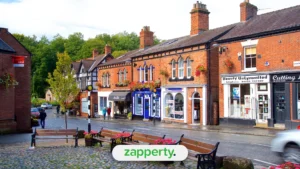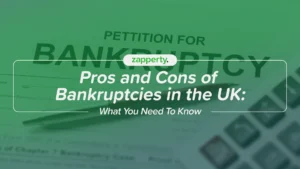In 2025, the UK property market continues to feel the stinging effects of high interest rates. On top of this, there are shifting buyer priorities and ongoing pressures when it comes to affordability, thanks to the persistent cost-of-living crisis. While houses remain popular, flats also make for increasingly more attractive options, especially when it comes to first-time buyers, downsizers and those looking for something a little more accessible. Flats are also a popular choice for those looking to move into the hustle and bustle of a city.
But, is buying a flat really worth it in 2025? In this guide, we’ll break down the pros and cons to help you decide whether a flat is the right move for your lifestyle, finances and long-term property goals.
This article will cover:
- Flats offer an affordable entry to the UK property market, especially for first-time buyers and those downsizing.
- Urban flats provide convenience and proximity to amenities, making them appealing to a diverse range of buyers, including professionals and investors.
- Despite challenges like leasehold complexities, flats remain attractive for their lower upfront costs and simplified maintenance.
- How you can sell your house fast if you’re looking to free up equity and buy a flat.
Who Buys Flats in the UK Today?
This year, flats are a popular choice for many types of buyers. Each buyer type has their own motivations, influenced by lifestyle, financial goals, market conditions and even their families and careers.
First-time buyers
First-time buyers often consider flats because of their affordability, especially when compared to houses. With average house prices still out of reach for many younger buyers, flats are a more realistic way for people to finally get onto the property ladder. And as it’s common for flats to be located in busy urban areas, many people are also attracted to the convenience of locations near transport hubs, amenities and workplaces.
Downsizers
Downsizers, particularly those part of the older generation and retirees, frequently sell larger family homes to move into smaller flats. This is because they might not want to look after a big house anymore, with flats requiring less maintenance and lower costs. There may also be the added benefit of being closer to shops, healthcare or grandchildren. Downsizing to a flat can also free up equity, providing a financial cushion or extra funding for retirement.
Investors
Buy-to-let investors continue to see flats as attractive rental assets, especially in areas with high tenant demand like university towns or areas popular with commuters. Because flats tend to be more affordable than houses, they typically have lower upfront costs and are easier for landlords to manage.
Urban movers
Urban movers, like professionals or remote workers seeking a hybrid lifestyle, choose flats for their central city locations. Whether relocating for work or simply wanting to live closer to the range of amenities and facilities offered by a central-city location, flats are often the go-to option.
Those experiencing financial pressures
Homeowners facing financial pressures may have to sell larger houses and move into flats to reduce living costs and free up equity. Rising mortgage rates, energy bills or changes to personal circumstances are just some of the reasons why this might be a necessity. Doing this means sellers can stay on the property ladder while lowering outgoings.
Pros of Buying a Flat
Whatever reason you might have for considering buying a flat, they have plenty of advantages that make them incredibly attractive:
- Lower purchase prices: Flats are generally more affordable than houses, making them appealing for first-time buyers, downsizers and anyone trying to get around high interest rates but get on or stay on the ladder.
- Convenient locations: You’ll often find flats in city centres or well-connected areas, offering easy access to work, public transport, shops and entertainment.
- Simplified maintenance: External repairs, structural upkeep and communal area maintenance are typically managed by a building or property management company. This reduces the burden on individual owners, but you will need to pay service charges.
- Modern amenities: Newer or purpose-built flats often come with perks like concierge services, security systems, lifts, bike storage and shared outdoor spaces like gardens or rooftops. Some even have on-site gyms and laundry facilities.
- Ideal for smaller households: Flats are a good fit for singles, couples and retirees who don’t need the extra space or want the added responsibilities of a house.
- Attractive to renters: Flats in popular locations can be easier to let out due to their affordability, amenities and low maintenance, making them appealing to buy-to-let investors.
Cons of Buying a Flat
While buying a flat is incredibly appealing, there are still some downsides you need to be aware of before committing:
- Leasehold ownership: Most flats are sold as leasehold rather than freehold, meaning you don’t own the building or land. This means there are ongoing costs like ground rent, service charges and contributions to major works.
- Additional costs: Costs like service charges can rise over time. Ground rent and fees for management packs or lease extensions can also add up, which may reduce long-term affordability. If the lease is due for renewal, this can also impact how easy it will be to sell the property in the future.
- Noise and privacy: Living in a shared building increases the likelihood of noise from neighbours, especially if there isn’t modern soundproofing.
- Limited space: Flats typically offer less living space, which can make them unsuitable for growing families or those who need a lot of storage.
- Slower capital growth: Flats often appreciate in value at a slower rate than houses, especially in areas where leasehold concerns or oversupply impact demand.
- Lifestyle restrictions: Lease agreements may include rules around keeping pets, making alterations or subletting, which reduces your flexibility and can impact your plans.
Leasehold Flats: What You Need to Know
Freehold flats are quite rare, so if you choose to buy a flat you’ll need to familiarise yourself with what a leasehold property involves.
Length of lease
Buying a leasehold flat means you’re purchasing the right to occupy the property for a fixed number of years, typically between 99 and 125 years. As the lease shortens, especially once it drops below 80 years, the flat may become harder to sell and more difficult to mortgage.
Extending the lease is possible, but it can be expensive. It’s best to address a short lease early, ideally before it drops under 80 years, to avoid higher costs and legal complications. Leaseholders usually have the legal right to extend their lease after owning the flat for two years.
Service charges
In addition to the lease term, you’ll also need to budget for annual service charges, which cover things like building insurance, communal area cleaning, repairs and sometimes heating or water. Major works, such as roof replacements or lift repairs, are billed separately and can arrive with little notice. As of 2025, leasehold reform is still in progress, with proposed changes aimed at simplifying the system and reducing costs.
Leasehold flats continue to be the standard in most urban areas, particularly in larger developments.
Leasehold checklist
Before you commit to buying, always check:
- The remaining lease length
- The history and cost of past service charges
- Any planned or upcoming major works
- Whether you’ll have the right to extend the lease and at what cost
If you’re looking to buy a leasehold flat but the listing doesn’t reference the length of the lease, make sure you find this out. You need to understand exactly what you’re buying and how it will impact you long-term, to make sure you’re spending money on a sound investment.
Council Flats: Are They Worth It?
A council flat is a property originally owned by a local authority. Some buyers purchase these through the Right to Buy scheme, often at a big discount. However, you need to have been a public sector tenant for a minimum of three years before you qualify.
The main benefit is the lower purchase price, which can help you onto the property ladder or a long-term place to live with low outgoings. However, some mortgage lenders can be hesitant to finance these properties, and resale can be slower due to apprehension from some buyers and some restrictions on who can buy. You may also need to pay back any discounts if you sell the property within five years of buying it.
But, if you qualify to buy a council flat and understand the limitations, it can be a solid, stable investment.
House or Flat: Which is Right for You?
If you have a larger budget to use, you may wonder if you should choose a house or flat.
Flats are generally the top choice if price, convenience and location are most important to you. Houses offer more control, space and long-term appreciation, and are more likely to have private outdoor spaces. So, if you need a garden, room to grow a family or fewer restrictions on home improvements, a house is probably going to be the better fit.
That being said, the budget is usually the most important deciding factor. It all comes down to what you need vs what you can afford. So, if your budget can only stretch to a flat, that’s fine – these properties are definitely still worth it in 2025.
When Buying a Flat Makes the Most Sense
Buying a flat can be a smart move in the following situations:
- You’re downsizing for financial flexibility or a simpler lifestyle.
- You want to live in a high-demand urban area where houses are out of your budget.
- You have a short-term property plan, such as three to five years.
- You’re trying to make a tight budget work in a market with rising interest rates.
When It Might Not Be Worth Buying a Flat
You may want to think twice if:
- You need plenty of space, outdoor access or room for a growing family.
- You’re put off by leasehold complications or high service charges.
- You plan to stay long-term and want complete control over the property.
So… Is Buying a Flat Worth It in 2025?
In 2025, buying a flat can absolutely be worth it. The decision is yours to make, but all signs point to yes, so long as it aligns with your lifestyle, goals and budget. For many people, it’s a practical and affordable route to homeownership or a way to free up some equity by downsizing. But it’s important to weigh the pros and cons, especially around leasehold issues and long-term value. Before you make your decision, make sure you understand what this would mean for you and if the additional charges fit within your monthly budget.
Key takeaways:
- Evaluating the pros and cons of flats is essential, considering factors like leasehold terms and potential additional costs.
- Flats are beneficial in specific scenarios, such as seeking financial flexibility, urban living, or short-term plans, but may not suit those needing more space or long-term control.
- For those selling a house to buy a flat, services like Zapperty can offer a fast sale, aiding transition without legal stress or delays.
Thinking of Selling Your House to Buy a Flat?
Whatever your reason for buying a flat, whether downsizing or moving due to a change in circumstances, Zapperty can help. We buy houses quickly for cash, so you can free up equity and make your next move without delays, chains or legal stress.
No solicitor fees. No hassle. Just a fast, fair sale. Sell your house fast with Zapperty




